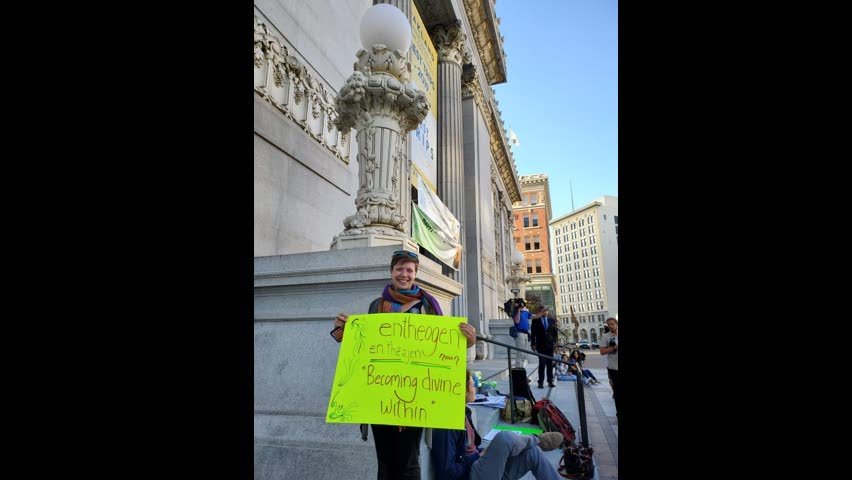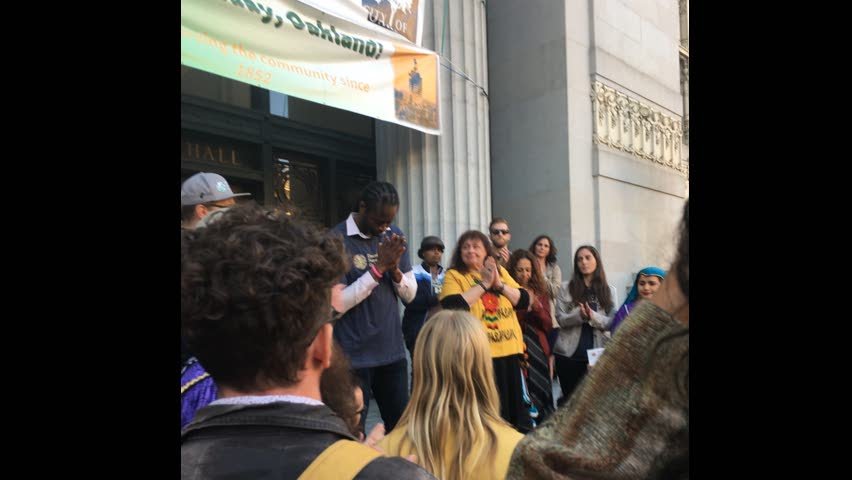My reflections on this historic milestone and what questions follow.
Oakland, CA decriminalized nature Wednesday! Congratulations to everyone at Decriminalize Nature who contributed to the work of destigmatizing psilocybin containing mushrooms, iboga, ayahuasca and mescaline containing cacti. It was an honor to be present for such a historic event. Bravo!

I was really touched to witness the sharing that went on after the hearing. To listen to what this meant to every person who was involved, and how these plants and fungi had aided them on their various beautiful journeys, was unforgettable. This trip to San Francisco was full of new information, beautiful connections and interesting experiences for me.. and I return to the farm with a lot of questions to ponder.. some fresh, some long standing.
What I am certain about is that decriminalization, legalization, innovation, research, therapeutic support, or any other work that people are doing around psychedelics, MUST take into account the most vulnerable and marginalized among us.
Learn what indigenous land you are sitting on and seek relationship with the people who steward that land. Ask their permission for some of their time, and if they agree, ask their permission for events you want to hold and invite them to open up the space in their custom (thank you Kanyon Sayers-Roods).
Learn the history of the medicine you are selling, researching, working with, etc., and learn about the indigenous traditions of use of that medicine. If it is endangered, don’t use it, and do what you can to protect it so that people still have access to their sacrament.
Ask psychedelic entrepreneurs who they are accountable to and what measures they have in place to make sure that everyone will have access and safety. If you aren’t trying to provision this medicine/technology/experience for everyone, especially those that need it most, ask yourself why that isn’t a priority, and be upfront about it.
If you’re a researcher, consider working on a study/legislation that finds results which generalize to underserved populations, and create new protocols, informed by people from those communities. If you’re a policy maker, consider working on legislation that integrates solutions for the housing crisis, the mental health crisis, consent in care and other topics that relate to decriminalization or legalization measures (thanks Allie Rose for originating this idea). Let your laws be informed and guided by people from the communities who’ll be most affected.
If you’re a provider, above or underground, recognize that there is a lot of potential for healing as well as harm in this work. Take that seriously. Do your individual work so you can be in fullest integrity; create a network of peer support; consult your elders; actively seek to create and uphold measures that honor peoples’ right to bodily autonomy, safety and dignity. Do not be a bystander to abuse or risky behavior.
Listen to people coming forward with stories of harm. Support them. Consider a trauma-centered approach to addressing harm in the community and learn about restorative and transformative alternatives to carceral punishments which typically do not address the core issue.
This list is by no means complete. I invite you to add suggestions for people to consider embodying, and to inform me about how any of these suggestions could be better phrased.

One of the most profound things I’ve been doing lately for my own accountability is asking myself “why am I doing this work?” I would propose to anyone who is making any social and/or financial capital off of psychedelics to critically examine their motives. I know that while I personally feel that I have good intentions, there is also space for my shadow to show up. I notice this through witnessing inner desires to be friends with everyone, to help everyone, to have my voice be heard and my work be known. Even if the intentions for THOSE desires are good, too, it’s important to recognize that my actions are going to be impacted by all parts of me, including trauma and personality and shadow. Recognize what is driving your work and the way you show up to this movement. Be radically honest about it. #Nomorehiding
Just a few humble suggestions. I would love to see more of our psychedelic community getting involved with non-psychedelic issues that would benefit from our empathy, creativity, resources and commitment. In the words of La Pachamami, “I can only hope people care about indigenous, mestizo, & Afro-Latinx unaccompanied/separated refugee youth from the Northern Triangle as much as they care about the psilocybin mushrooms that were used ceremoniously by our ancestors before colonizers prohibited our ceremonies through massacres that continue to leave a trace on our blood stained homelands. This summer we must embody & initiate ourselves to become the #JustTransition. Enough is enough.”
There are so many ways to embody compassion and care. I believe that the psychedelic community needs to stay aware of other issues besides what happens within the mainstream or underground psychedelic bubble. There are extremely unethical things happening at the border and via ICE. There is racism, sexism, homophobia, transphobia, ableism, islamophobia, antisemitism, capitalism, fascism and many more oppressive structures to be aware of, deconstruct, and take care not to replicate in this new movement being birthed. Thanks for reading and I hope we can keep talking about how to create the more beautiful world our hearts know is possible.